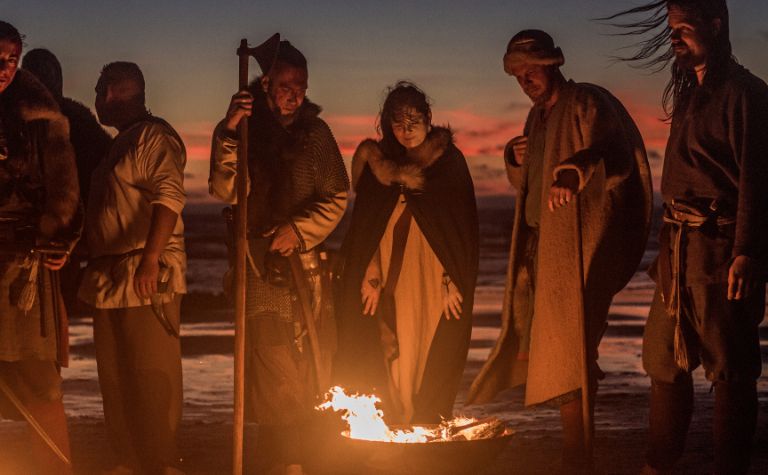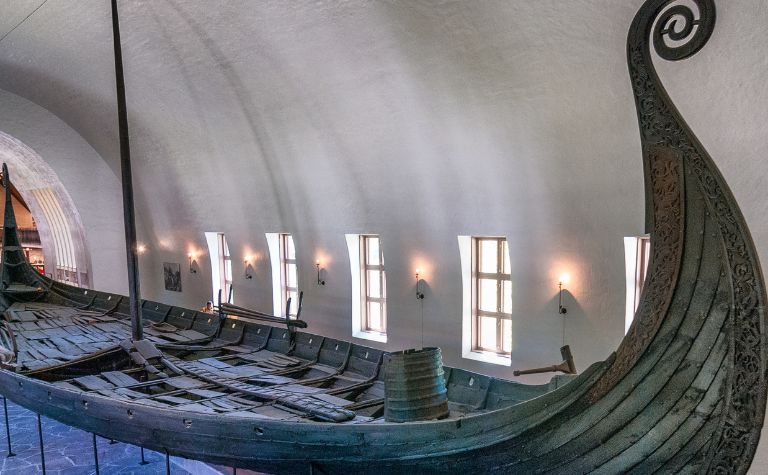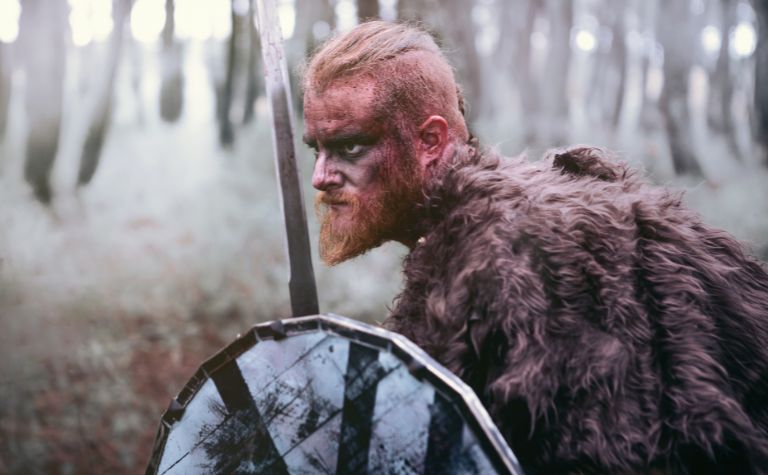Between the 8th and 11th centuries A.D., Norse pirates known as Vikings ravaged many parts of Northern Europe in search of treasure, women, slaves, and lands to settle.
Inevitably, they developed a reputation for brutality, rape, and pillage. But were all the Vikings bad or evil?
Not all the Vikings were bad or evil. While Vikings have an outsized reputation for brutality, they were no more violent or depraved than other peoples of their time.
Although many were fearsome warriors, others were farmers, traders, and artisans looking to peacefully settle new lands.
The remainder of this article will explain the reasons for the Viking’s terrible reputation.
It will also show that Viking brutality was of its age and leavened by other, more virtuous qualities.

Why Were Many Vikings So Cruel?
Many Vikings were cruel because their missions required them to be so.
While largely in keeping with the standards of their day, their cruelty was deemed excessive by later generations because Vikings were culturally distinct from their chroniclers and left no written records of their own.
The Norse were an early medieval North Germanic people largely based out of Scandinavia. While their society produced Vikings, not all Norse people were Vikings.
The term Viking referred to only those Norse who chose to join raiding parties that would travel to other lands to plunder or settle them. [1]
Since other peoples were not likely to hand over their wealth or land to the Vikings voluntarily, traveling Viking bands had to use violence to achieve their ends.
By definition, being a Viking was a brutal enterprise, as Vikings had to use violence to achieve their strategic ends.
Moreover, once established, their fierce reputation often enabled the Vikings to achieve their ends with minimum use of force.
An example of this strategy is the Vikings’ use of the threat of invasion or devastation to repeatedly demand and collect ransoms from their neighbors. [2]
Vikings were also not the only people of their time who had a penchant for violence.
Brutality was much more widespread at the time than it is today, and it can be argued that the Vikings’ contemporaries were every bit as aggressive and cruel as the Vikings in their actions.
The Frankish monarch and Holy Roman Emperor, Charlemagne, is reported to have murdered thousands of Saxons at Verdun in 782 A.D. to quell a rebellion. [3]
Similarly, King Æthelred of England ordered a massacre of all Danes in England in 1002 A.D. after suspecting an impending takeover of his kingdom by the Danes. [4]
However, there is one more critical aspect to understanding the Vikings’ outsized reputation for violence and brutality.
Norse tradition was largely oral and left no written records of their society.
Because of this, the depictions of their exploits available today are all from the perspective of their victims. [5]
Moreover, the Norse were among the few remaining pagan cultures in the region at the time.
Most of their European opponents were Christian and horrified by Viking traits seen as blasphemous–such as pillaging monasteries–or abhorrent–such as animal sacrifices.
Inevitably, their chronicles of the Vikings uniformly depicted them as brutes.

What Horrible Things Did the Vikings Do?
Horrible things that the Vikings did include:
- Mass murder
- Rape
- Looting
- Torture
- Slave trading
- Female infanticide
- Human and animal sacrifices
- Violent sports leading to the death of humans and animals
Tales of the Viking’s brutality were already legendary in their own time.
They were slave traders who regularly used mass murder and rape in the course of pillaging their victims’ wealth.
There are also several instances–recorded in chilling graphic detail–of the Vikings torturing their enemies. [6]
In recent years, there has also been speculation that one of the reasons Vikings set off on their voyages was a shortage of brides in their homeland caused by customs of selective female infanticide. [7]
Finally, many of the pagan customs of Norse society today seem horribly violent.
For instance, like many other pagan cultures, Viking rituals regularly involved both human and animal sacrifices.
Furthermore, Viking sports were often brutally violent, frequently resulting in the deaths of both animal and human competitors.

Did the Vikings Do Anything Morally Good?
The Vikings did many good things, including making advancements in sea-faring and navigation technologies and expanding trade and cultural exchange around the world.
They also developed a more democratic society, had progressive gender relations, and refined the decorative arts and literature.
While Vikings were traditionally depicted as a barbaric people, their reputation has been reviewed periodically.
Today’s scholars have a more nuanced understanding of the complexity of Norse culture and a greater appreciation of their contributions to history.
Viking longships and navigation techniques allowed them to sail the ocean as well as cruise up more narrow and shallow rivers at good speeds.
These nautical technologies–which were highly advanced for the time–allowed the Vikings to strike quickly and use the element of surprise in their favor. [8]
The same technologies also made the Vikings among the greatest early explorers of our world.
They traveled far and wide–from Newfoundland in North America to Baghdad in West Asia–establishing settlements and trade routes that connected different peoples and influenced everything that followed. [9]
Vikings set up settlements in many places on the mainland of Northern Europe and England, significantly influencing these cultures in later years.
Even today, traces of this influence can be seen in everything from the development of legal and parliamentary structures to modern European languages.
Besides, not all Norse people were warriors; many were peaceful settlers, traders, farmers, and craftspeople.
They produced many fine examples of decorative art.
And their oral tradition included some of the earliest epic sagas to come out of Europe. [10]
Curiously, despite their reputation for masculinity and violence, the Norse had some of the most progressive gender relations of their time.
Norse women had a greater role in public life than women in other parts of Europe at the time. And Norse law had some of the earliest provisions for settling divorces. [11]
At the time, cultural differences between Vikings and their early victims obscured these more refined aspects of Norse culture.
Today, they temper scholars’ understanding of Vikings as more than merely barbaric people.
Vikings seem brutal by modern standards but were no more so than other peoples of their day. They also made positive contributions to human progress.
Conclusion
Vikings seem brutal by modern standards but were no more so than other peoples of their day. They also made positive contributions to human progress.
